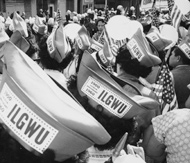

Archive Transcript: Speeches
Louis Stulberg's Speech at the 50th Anniversary of the International Labor Office
50th Anniversary of the International Labor Office
Remarks by Louis Stulberg
June 5, 1969
The 50th anniversary of the International Labor Office serves to remind us that we are still a good way off from that universal brotherhood which has been the hope and the dream of working men and women throughout history.
After World War I, Samuel Gompers led in creating the ILO in the spirit of that brotherhood.
And he did so as the head of the American labor movement thus emphasizing that the things that divide men-color, language, belief, race, customs, geography, creed-all of these do not affect the sameness of the blood spilled in war and the sweat drawn from the exploited laborer.
In its work through half a century, the ILO has stressed the sameness of men as workers.
It has proceeded on the humanitarian assumption that there must be limits-in pay and in hours and in work conditions-beyond which work becomes sub-human no matter where and by whom it is done.
Human life is sacred and human labor must respect that life.
Through its conventions, its conferences and field work and its publications the ILO has spread this faith in humanitarianism.
It has also spread the idea that the world has been transformed by trade and commerce into a huge workshop.
Through the exchange of goods and services, the fruits of labor of one nation become the commodities for sale in another.
Export and import gather products from all over the world into single market places; differences in price tags become symbols of difference in standards of work and wages and levels of profits.
This is not essentially different from the conditions that prevail within a nation.
The American trade union has battled and bargained to establish by law and contract the principle that that business competition in the market place must not be at the expense of the exploitation of labor.
We in the garment industry have spent our energy and our resources fighting for these two basic ideas, namely, that there are minimums beyond which no worker must be driven and that we are in effect one vast garment-producing workshop sending apparel from all centers of production into all centers of merchandising.
More than half a century ago and far in advance of public policy, we struck for a schedule of minimum wages.
Such concepts of minimum, now firmly based in law, contract and practise [sic], have not curbed the competition that is characteristic of our free way of life.
On the contrary, they have intensified the search for more civilize forms of competition within the restrictions Samuel Gompers had in mind when he insisted that labor is not a commodity.
In this era of rising hopes and rising hostilities, of emerging freedoms and emerging problems the world could well profit from the lessons revealed by organized labor's efforts.
The experience of American labor as well as that of the ILO emphasizes the ethics of our movement.
We believe in the worth of each unique worker.
And we believe that this well-being must be our concern not only because the survival of our own standards is involved but also because so long as inequality, exploitation, subjugation exist, those of us who are more fortunate must be our brother's keepers.
Indeed, the survival of our free society, as we know it and have struggled to build it, may depend on the ability of the world to catch up quickly with the faith that is at the heart of the ILO.


